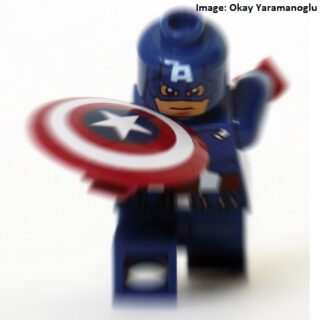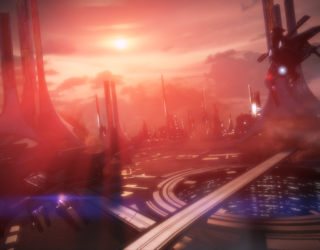Review contains spoilers
Let’s face it, comrades: we can’t spend all our time on the barricades, on picket lines, or in eight hour strike committee meetings. Sometimes we have to indulge ourselves in some mass-produced entertainment. Because said mass-produced entertainment is by definition an instrument of the capitalist system, crafted and disseminated through capitalist means, it naturally reflects capitalist values. For the thinking radical, consumption of mass-produced entertainment is invariably an exercise in cognitive dissonance. (Then again, the same can be said of many aspects of life under a capitalist, imperialist, patriarchal, white supremacist system.)
Granted, many documentaries, indie films, and high concept dramas cut against the capitalist logic to a lesser or greater extent, and many of these films are very good. But they tend to be serious works about serious issues, and sometimes, if you’re someone like me, you want to immerse yourself in a fun, escapist adventure story. It would be nice if once in a while you could find such a story which also critiques aspects of the status quo.
A decade ago, critiques of illegal wars abroad and crackdowns on civil liberties at home were somewhat in vogue even in mass entertainment, albeit heavy-handed and prone to treating such abuses as an aberration rather than the norm. But recently, even such mildly subversive material has mostly dried up, since approximately the time when the person in the White House overseeing the USA’s many programs of torture, terror bombing, mass murder, surveillance, and assaults on civil liberties switched from being a Republican to a Democrat.
Even when an escapist action adventure film does partially slip through the cracks and present some level of subversive material (e.g. 2013’s Elysium), it can still just come out a mediocre film in terms of entertainment value.
Imagine then, my delighted surprise to discover that a big budget, mainstream Hollywood action movie, with nationalism in the frickin’ title, and distributed by Walt Disney Studios of all things, has a profoundly subversive message, along with being top notch for a film of its type.
Permit me to expound a little upon that second point before I discuss the film’s politics. Captain America: The Winter Soldier mixes the standard superhero action with a political thriller plot, and strikes an impressive balance between the two. The plot is delightfully complex: straightforward enough that you can follow the gist of it as you watch, but elaborate enough that there are a few minor details I still don’t quite get after multiple viewings. The comic book action is terrific—the melee fights, in particular, are the most visceral and kinetic action sequences I’ve seen in a Marvel movie to date (and I’ve seen everything apart from The Incredible Hulk). I’m indifferent to the CGI vs. practical effects debate, but I can’t deny Directors Anthony and Joe Russo make terrific use of practical effects in this film, which probably helps to make the action feel more real and immediate. And the movie boasts one of the most riveting, down-to-the-very-last-second climaxes I’ve seen in ages.
The Winter Soldier also has the most menacing villains of the Marvel movie universe so far. The Chitauri and the dark elves are great fun, but they’re too fantastical to take seriously. Whereas in this movie, anyone could be a member of HYDRA—they are your coworkers, your colleagues, your friends, and you’ll never know their true colors until they’re pointing a gun at your head. Now that’s scary, especially when you throw in their control of three floating murder platforms, ready to rain down destruction upon you. HYDRA’s philosophy—that freedom is bad, and humanity needs authoritarian rule for its own good, basically Hobbesianism as related by a ten-year-old—is silly in the way it’s presented in-movie; but HYDRA forces are portrayed as cool, competent, and brutally efficient, practically the polar opposite to the comical yutzes we got in the first Captain America movie. Robert Redford delivers a magnificent performance as HYDRA leader Alexander Pierce—in his every scene, he makes you believe that he believes what he’s doing is for the greater good.
I don’t mean to oversell the movie, make out it’s a brilliant piece of cinematic storytelling for the ages, or anything. I’ve heard Guillermo del Toro’s 2013 film Pacific Rim characterized as a smart dumb action movie, and as oxymoronic as that sounds, it’s the best way I can think of to describe Captain America: The Winter Soldier. At heart, it’s a silly superhero movie, but it’s a very smart and well-made silly superhero movie.
Admittedly, the protagonist is a straight, white, neurotypical, nondisabled, cismale, a demographic niche which is grossly overrepresented in Marvel movies and Hollywood in general. In that context, though, the film does a better job handling race and gender than many. It includes multiple competent, proactive and likable female characters, each of whom is feminine in her own way, without femininity being the defining character trait for any of them. None of them are subjected to sexual violence or any other kind of violence over and above what their male colleagues face, nor are any of them victimized in order to further a male character’s storyline (except, lamentably, Renata, a walk-on character murdered by Pierce to emphasize that he’s the bad guy). Nor are any of them subjected to gratuitous fanservice shots. And with the unfortunate exception of the aforesaid Renata, they all survive to fight another day. I could wish Natasha Romanoff/Black Widow (Scarlett Johansson) had a bigger contribution to foiling HYDRA’s evil plan, and Cobie Smulders is once again awesome but underutilized as Agent Maria Hill, but overall, in terms of depicting (white) femininity, Captain America: The Winter Soldier comes pretty well.
It also eschews toxic, patriarchal masculinity. Steve Rogers/Captain America (Chris Evans) and the other male protagonists are comfortable in themselves, and freely acknowledge their vulnerabilities and limitations. They treat the people around them as partners on an equal footing, rather than as objects or potential rivals. While both female and male characters dish out incredible amounts of violence—it is an action movie, after all—none of them judge their own worth or other peoples’ on their ability to inflict or withstand violence.
Plus, how many mainstream films period—let alone mainstream superhero films—can you name which depict a healthy, platonic, explicitly nonsexual and nonromantic friendship between the female and male lead, and don’t even feel the need to draw attention to this fact?
In terms of race, the movie boasts two unrelated black (male) protagonists, both flawed but ultimately heroic, both of whom play a crucial—if secondary—role in the heroes’ victory, and both of whom also survive to the end. I feel less confident assessing the portrayal of race as opposed to gender, but to my only partially informed eye, neither Nick Fury (Samuel L. Jackson) nor Sam Wilson/Falcon (Anthony Mackie) fall into any obvious racial stereotypes. Sadly, this movie also reveals that the only recurring Latino character in the Marvel film universe thus far, Jasper Sitwell, is a HYDRA operative, and ignominiously kills him off.
Good (or at least okay) race and gender politics are an excellent start, but there are films and TV shows out there which boast both, if not as many as there should be. That alone is nice, but as it turns out, there’s more.
Early in the movie, Fury introduces Steve to Project Insight, three heavily armed Helicarriers to patrol the planet’s skies and launch devastating preemptive strikes against potential threats to peace. If you’re anything like me, this program will have raised about a dozen red flags for you, as it’s basically a mix of mass surveillance with the drone assassination program, cranked up to eleven. Big Brother is not only watching, he’s packing serious heat.
Steve raises some rather simplistic objections to the program (“I thought the punishment usually came after the crime,” “This isn’t freedom. This is fear”) which, though valid, don’t really get to the heart of the issues of privacy, due process, accountability, and collateral damage raised by real world programs of mass surveillance and drone assassination. Fury brushes these concerns away with an evasive non-answer worthy of any establishment spin doctor, “SHIELD takes the world as it is, not as we’d like to be.”
The really clever part about this scene is that it subtly sets up Steve Rogers, not Nick Fury, as the one who’s being short-sighted, and will have to learn the error of his ways by the end of the movie. But after the reveal, we find that SHIELD in general and Project Insight in particular have been under the control of HYDRA the whole time, with the express purpose of establishing an authoritarian dictatorship by murdering 20 million people with Project Insight.
In the scene where Doctor Zola (Toby Jones) explains how HYDRA came to infiltrate and dominate SHIELD, he says World War II taught them that humans will fight tenaciously for their freedom, and have to be subtly convinced to give it up voluntarily. He gleefully relates how HYDRA has manipulated conflicts throughout the world over the intervening seventy years to prime humanity to accept tyrannical rule. I’ve seen at least one person object to the implication that all of the major calamities and upsets of the past several decades were the work of an evil secret society trying to take over the world, as that denies human agency in creating the world we presently live in. However, a more generous interpretation of Zola’s words which is equally supported by the film would be that HYDRA exacerbated existing trends, and then only in some cases. And given the well-documented relationship between the so-called War on Terror in much of the Middle East and Africa, and the increase in draconian police powers and austerity measures in countries like the US and UK—and the resultant increase in wealth of the super- and hyper-rich in those societies at the expense of everyone else—the idea of an evil organization fomenting strife throughout the world as an excuse to foist a police state onto a relatively free and cooperative populace doesn’t exactly seem far-fetched. It’s just rarely commented upon in the corporate media. Whether or not the satiric point was intentional on the part of the filmmakers, it was well made.
In another nice touch, the algorithm HYDRA uses to pick the targets for its Insight Helicarriers is explicitly based on reading people’s metadata (though the word itself is never mentioned, perhaps because the Snowden leaks only came to light while the film was in mid-production). In milder form, the algorithm bears a striking similarity to the real life Recorded Future Inc, which “extracts time data from social media, including text searches, allowing the observer to know which tweets refer to not only to them, but to them on Tuesday, or next week or next month. Recorded Future offers its products not only to government intelligence entities, but to private companies to help them predict protests and public pressure campaigns.”
In the build-up to the climax, where the heroes prepare to take out HYDRA and Project Insight, Steve insists they must dismantle SHIELD as well. When even Fury’s second-in-command, Agent Hill, agrees with Steve, Fury reluctantly complies. HYDRA aren’t just a few bad apples contaminating an essentially good organization, the organization itself has been fundamentally corrupted by HYDRA’s influence, and must be torn down along with with the rest.
The message of the film is profoundly anti-surveillance and anti-drone, as both of these programs are portrayed as the tools of a group of fanatical would-be mass murderers trying to install a neo-fascist dictatorship over the entire world. And it’s not that they’re good tools being used by bad people; the way they’re used even by good guys like Natasha and Nick Fury inherently promotes a fascist agenda. The problem with these programs is systemic, not just policy. They can’t be reformed, they must be abandoned.
The movie also comes out strongly on the side of transparency. While Steve, backed up by Sam, is taking out the Helicarriers, Natasha dumps all of SHIELD’s secrets, in classic 21st century whistleblower fashion, onto the internet, thus exposing HYDRA and—among other things, her own sordid past. This is a necessary component of dismantling SHIELD and HYDRA; the clandestine, unaccountable nature of SHIELD’s operations is precisely what allowed HYDRA to fester within it for so long. To paraphrase a pity quote I recently read and have been maddeningly unable to track down again, “power thrives in secrecy, it withers in daylight.”
The next point bears a disclaimer: I am a pacifist, I believe absolutely and unconditionally in the sanctity of human life, and do not personally advocate violence against even the worst enforcers of the capitalist system—certainly not in circumstances other than strict self-defense. But watching an action movie already necessitates buying into the idea that some human beings are unambiguously and irredeemably evil, their deaths cause only for celebration, in the context of the movie. I can make that cognitive dissociation for entertainment purposes, or I wouldn’t enjoy action movies nearly as much as I do.
Once one has accepted that idea for the sake of enjoying a film, there’s a deliciously sick element of revenge fantasy to watching Samuel L. Jackson as Nick Fury massacre a platoon of white guys in police uniforms who are trying to murder him. (Film dialogue implies these are not actual cops, but HYDRA impostors, which makes sense given HYDRA’s modus operandi. For me, revenge fantasies are more about symbols than actual people in any case, so it works just as well either way.)
The politics of Captain America: The Winter Soldier are far from perfect. In that same conversation where Fury reveals the details of Project Insight to Steve, we get the sole mention of US World War II atrocities, and then only to justify them with Steve’s assertion “Yeah, we compromised. Sometimes in ways that made us not sleep so well. But we did it so that people could be free.” Somehow, I doubt all of the US soldiers who took part in, e.g., the war crimes listed here did so for such high-minded reasons. And even if most of the soldiers were under that delusion, the politicians who directed the war and personally authorized the worst atrocities undoubtedly knew better.
The movie also replicates uncritically two interlocking myths about torture which have been propagated in Western media throughout the War on Terror era. Whilst investigating HYDRA’s infiltration of SHIELD, Natasha, Steve, and Sam subject Agent Sitwell (Maximiliano Hernández) to a mock execution, after which he immediately spills his guts about Zola’s algorithm. This scene teaches us that, ethical and empirical evidence notwithstanding, torture is a legitimate and effective method of obtaining information from a hostile witness.
When questioned by a Senate subcommittee at the end of the film as to why she and the other main characters shouldn’t be imprisoned for their illegal actions, Natasha replies smugly that the elected officials won’t prosecute her or her friends because “You need us.” In other words, our heroes are above the law because only they are powerful enough to protect the world from evil forces—kind of undermines the whole public accountability thing.
And in the montage showing where the rest of the characters ended up after SHIELD’s dissolution, we see Steve’s future love interest Sharon/Agent 13 (Emily VanCamp) has joined the CIA. Her happy ending is employment at an organization which makes HYDRA look like a little league softball team.
But to put things in perspective, these and other reactionary elements—problematic though they are—are mere details, providing minor plot points or incidental to the plot entirely. The condemnation of intrusive surveillance by clandestine organizations (corporate or governmental) and of drone assassinations and the War on Terror, by contrast, are integral to the plot. These are the tools of would-be tyrants and their dupes, and must be resisted whenever they rear their disgusting heads—that is the essential message of Captain America: The Winter Soldier.
Perhaps more importantly than all the rest, the movie contains one last huge gift to the Left, and to civil libertarians in general, one I’m a little astonished I haven’t seen more activists latch onto. It’s often difficult for dissidents to articulate political ideas which cut against the prevailing narratives propagated by the corporate media to non-activists in a concise manner. There’s often a intellectual gulf you need to bridge before you can make any headway. This is one reason why, in my view, easily recognizable slogans like “We Are the 99%” are still immensely valuable, even if they’re not strictly accurate and grossly oversimplify the issues.
What’s even better than a snappy slogan that contains a core of truth to it? How about a snappy slogan with a core of truth to it that doubles as a pop culture reference? Pop culture can be a great way to bridge that gulf between you and the average non-activist—by definition, pop culture is mainstream, and thus something you and they likely have in common. It establishes affinity between you, and it also dispels the stereotype of activists as grim, joyless ideologues. Never underestimate the power of humor and playfulness to fight oppression and win people over—just ask the Yes Men.
So the next time you see someone arguing that government agencies or contractors collecting private information en masse, drone strikes, and other such authoritarian measures are justified because they “catch terrorists/criminals,” “protect us from terrorists,” “protect freedom,” or the like, you no longer need spend several minute (maybe over an hour) crafting a well-reasoned, analytical rebuttal. Thanks to Captain America: The Winter Soldier, you have a ready-made two-word response to debunk such facile arguments: “Hail Hydra.” That’s what such arguments are really saying, after all. Try it out sometime.



